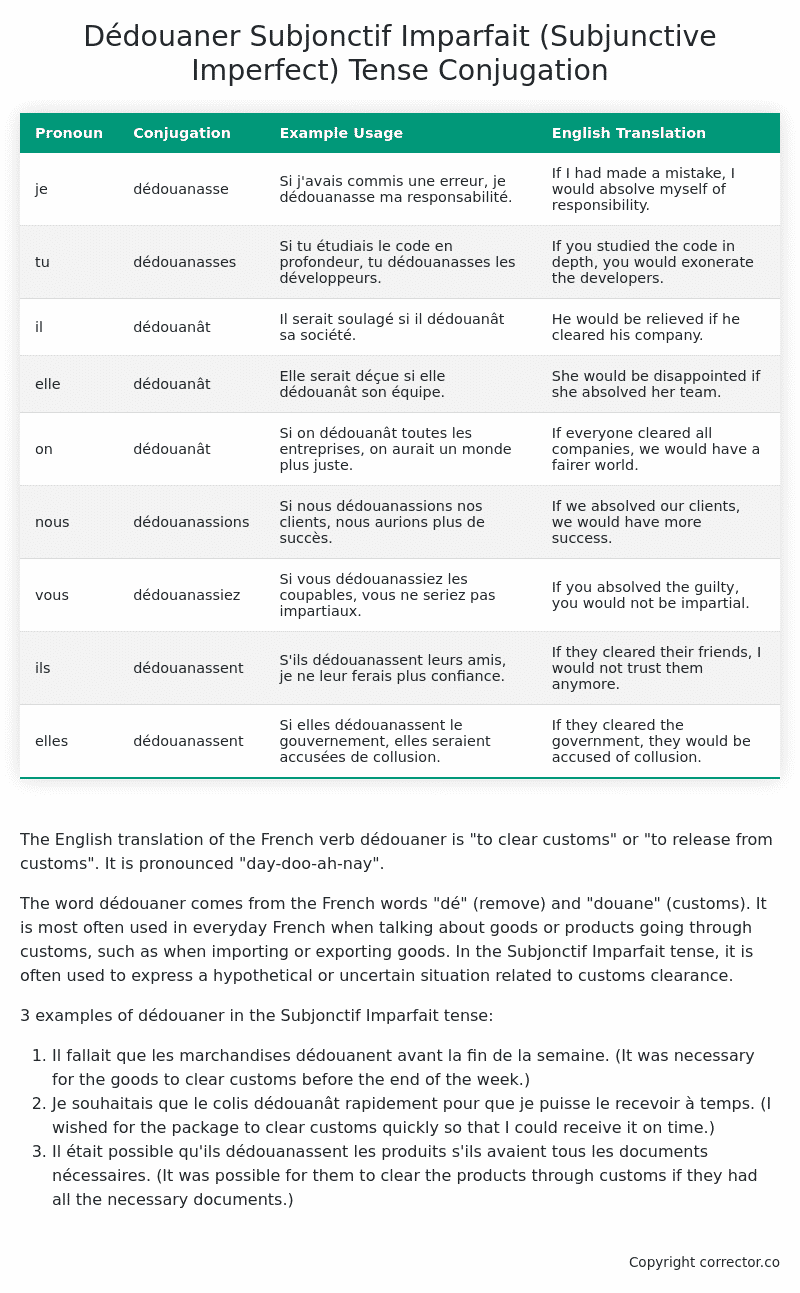Subjonctif Imparfait (Subjunctive Imperfect) Tense Conjugation of the French Verb dédouaner
Introduction to the verb dédouaner
The English translation of the French verb dédouaner is “to clear customs” or “to release from customs”. It is pronounced “day-doo-ah-nay”.
The word dédouaner comes from the French words “dé” (remove) and “douane” (customs). It is most often used in everyday French when talking about goods or products going through customs, such as when importing or exporting goods. In the Subjonctif Imparfait tense, it is often used to express a hypothetical or uncertain situation related to customs clearance.
3 examples of dédouaner in the Subjonctif Imparfait tense:
- Il fallait que les marchandises dédouanent avant la fin de la semaine. (It was necessary for the goods to clear customs before the end of the week.)
- Je souhaitais que le colis dédouanât rapidement pour que je puisse le recevoir à temps. (I wished for the package to clear customs quickly so that I could receive it on time.)
- Il était possible qu’ils dédouanassent les produits s’ils avaient tous les documents nécessaires. (It was possible for them to clear the products through customs if they had all the necessary documents.)
Table of the Subjonctif Imparfait (Subjunctive Imperfect) Tense Conjugation of dédouaner
| Pronoun | Conjugation | Example Usage | English Translation |
|---|---|---|---|
| je | dédouanasse | Si j’avais commis une erreur, je dédouanasse ma responsabilité. | If I had made a mistake, I would absolve myself of responsibility. |
| tu | dédouanasses | Si tu étudiais le code en profondeur, tu dédouanasses les développeurs. | If you studied the code in depth, you would exonerate the developers. |
| il | dédouanât | Il serait soulagé si il dédouanât sa société. | He would be relieved if he cleared his company. |
| elle | dédouanât | Elle serait déçue si elle dédouanât son équipe. | She would be disappointed if she absolved her team. |
| on | dédouanât | Si on dédouanât toutes les entreprises, on aurait un monde plus juste. | If everyone cleared all companies, we would have a fairer world. |
| nous | dédouanassions | Si nous dédouanassions nos clients, nous aurions plus de succès. | If we absolved our clients, we would have more success. |
| vous | dédouanassiez | Si vous dédouanassiez les coupables, vous ne seriez pas impartiaux. | If you absolved the guilty, you would not be impartial. |
| ils | dédouanassent | S’ils dédouanassent leurs amis, je ne leur ferais plus confiance. | If they cleared their friends, I would not trust them anymore. |
| elles | dédouanassent | Si elles dédouanassent le gouvernement, elles seraient accusées de collusion. | If they cleared the government, they would be accused of collusion. |
Other Conjugations for Dédouaner.
Le Present (Present Tense) Conjugation of the French Verb dédouaner
Imparfait (Imperfect) Tense Conjugation of the French Verb dédouaner
Passé Simple (Simple Past) Tense Conjugation of the French Verb dédouaner
Passé Composé (Present Perfect) Tense Conjugation of the French Verb dédouaner
Futur Simple (Simple Future) Tense Conjugation of the French Verb dédouaner
Futur Proche (Near Future) Tense Conjugation of the French Verb dédouaner
Plus-que-parfait (Pluperfect) Tense Conjugation of the French Verb dédouaner
Passé Antérieur (Past Anterior) Tense Conjugation of the French Verb dédouaner
Futur Antérieur (Future Anterior) Tense Conjugation of the French Verb dédouaner
Subjonctif Présent (Subjunctive Present) Tense Conjugation of the French Verb dédouaner
Subjonctif Passé (Subjunctive Past) Tense Conjugation of the French Verb dédouaner
Subjonctif Imparfait (Subjunctive Imperfect) Tense Conjugation of the French Verb dédouaner (this article)
Subjonctif Plus-que-parfait (Subjunctive Pluperfect) Tense Conjugation of the French Verb dédouaner
Conditionnel Présent (Conditional Present) Tense Conjugation of the French Verb dédouaner
Conditionnel Passé (Conditional Past) Tense Conjugation of the French Verb dédouaner
L’impératif Présent (Imperative Present) Tense Conjugation of the French Verb dédouaner
L’infinitif Présent (Infinitive Present) Tense Conjugation of the French Verb dédouaner
Struggling with French verbs or the language in general? Why not use our free French Grammar Checker – no registration required!
Get a FREE Download Study Sheet of this Conjugation 🔥
Simply right click the image below, click “save image” and get your free reference for the dédouaner Subjonctif Imparfait tense conjugation!

Dédouaner – About the French Subjonctif Imparfait (Subjunctive Imperfect) Tense
Formation
Common Everyday Usage Patterns
Interactions with Other Tenses
Subjonctif Présent
Indicatif Passé Composé
Conditional
Conditional Perfect
Summary
I hope you enjoyed this article on the verb dédouaner. Still in a learning mood? Check out another TOTALLY random French verb conjugation!


